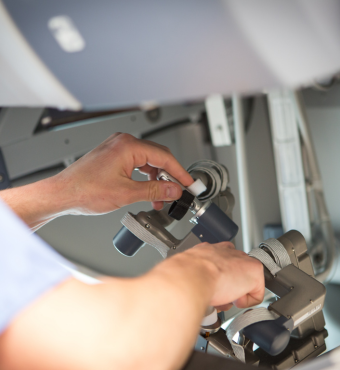
We are very proud to feature as an example of excellence in robotic surgery in the NHS 10 Year Plan, published today (Thursday 3 July).
The plan sets out the Government's vision for transforming the NHS during the next decade, with innovation and technology at the heart of its ambitions.
North Bristol NHS Trust is mentioned in the plan thanks to our innovative use of robotic surgery; an area the Government expects will revolutionise healthcare by 2035.
Surgeons at Southmead Hospital have completed around 9,000 robotic operations to date and the Trust has recently invested in two new robotic systems, bringing the total number to four.
Robotic surgery can offer shorter recovery times, reduced blood loss, a reduced length of hospital stay and reduced rates of readmission.
These systems are already helping people with a wide range of health conditions, such as prostate and bladder cancer and gynaecology conditions like endometriosis.
James Pain, a retired general surgeon who recently underwent a bladder removal and urinary diversion at Southmead, said he was delighted to have had his surgery performed with robotic assistance.
Mr Pain said: “As someone with extensive experience throughout my career in performing a ‘traditional’ approach to surgical operations, it was a privilege to experience firsthand the benefits of this new surgical technique from the patient’s perspective. I feel very fortunate to have had my operation carried out using robotic-assisted surgery.
“My recovery has been rapid and virtually pain free. Following a few days in hospital, I returned to daily activities at home with ease.
“I’m deeply grateful to the surgical team for their expertise and care in performing my robotic operation, and I look forward to seeing this innovative approach help thousands more patients like me in the future.”
Chief Medical Officer, Tim Whittlestone, said: “Robotic surgery has the potential to be truly-life changing for both patients and hospital teams: it can enable quicker and kinder recoveries and allows surgeons to carry out more procedures. This means we are able to reduce waiting times and treat more patients than ever before.
“This investment in robotic surgery will not only benefit patients but will also support the professional development of our surgical colleagues, enhancing Bristol's reputation for excellence in robotic-assisted surgery.”
NHS England estimates half a million operations will be supported by robotics every year by 2035.
John McGrath, Consultant Urological Surgeon at North Bristol NHS Trust and Chair of the NHS England Steering Committee for Robotic Assisted Surgery, said: “Robot-assisted surgery is a perfect example of innovation improving patients’ care and transforming the way the NHS works – the number of procedures being carried is set to rapidly grow over the next 10 years according to our analysis.
“As keyhole surgery continues to develop and scale up in the NHS, it is likely that many of these procedures will be provided with degrees of robot assistance in the future – importantly as the costs come down and efficient patient pathways are embedded in robotic programmes.
“Faster recovery and shorter hospital stays are not only hugely important benefits for patients undergoing surgery, if used efficiently they can have a positive impact on the rest of the system by relieving pressure on services and therefore helping to reduce waiting times.
“Robot-assisted surgery can also make complex operations less physically demanding for surgeons, with the potential to reduce strain on surgical teams, allowing a greater number of complex surgeries to be carried out each day.”
